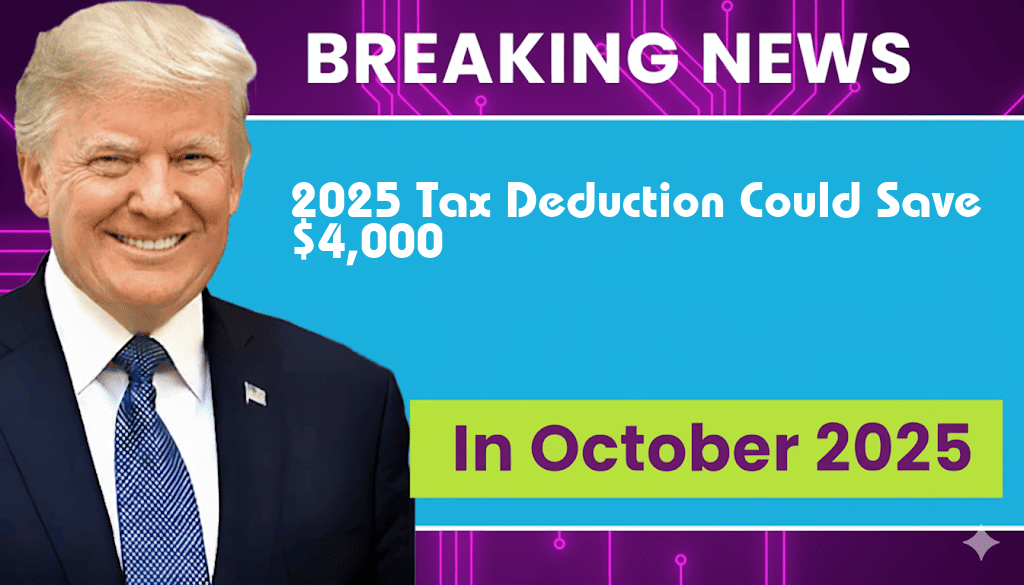New 2025 Tax Deduction Could Save Low-Income Families and Seniors an Additional $4,000
A proposed tax deduction set to take effect in 2025 aims to provide substantial financial relief for low-income families and seniors across the United States. The new initiative could allow eligible individuals to claim an additional $4,000 in deductions, significantly easing their financial burdens. Designed to address the growing economic pressures faced by these demographics, the deduction seeks to enhance disposable income and improve overall quality of life. Policymakers argue that this measure is essential in combating poverty and supporting vulnerable populations, especially in the context of rising living costs and inflation. The deduction is expected to stimulate local economies as families are enabled to spend more on essential goods and services.
Details of the Proposed Deduction
The new tax deduction is part of a broader legislative effort aimed at tax reform and social support initiatives. Here are some key features:
- Eligibility Criteria: The deduction is designed for families with an annual income below a specified threshold, which will be adjusted for inflation annually.
- Deduction Amount: Eligible low-income families and seniors can claim up to $4,000 on their tax returns.
- Implementation Timeline: The deduction is scheduled to be implemented starting in the tax year 2025.
Who Will Benefit?
The primary beneficiaries of this tax deduction will be low-income families and seniors, groups that often face significant financial challenges. According to recent studies, many households in these categories struggle to meet basic needs such as housing, healthcare, and education. The additional $4,000 deduction could provide a much-needed buffer against economic hardships.
Impact on Families and Seniors
This tax relief is expected to have a ripple effect on the economy. By increasing the disposable income of those who need it most, the deduction may lead to:
- Increased spending on essential goods and services.
- Improved access to healthcare and educational resources.
- Greater financial stability for families and seniors, reducing reliance on government assistance programs.
Economic Context
The introduction of this tax deduction comes at a time when many Americans are feeling the pinch of inflation and rising costs. According to the latest reports from the U.S. Bureau of Labor Statistics, inflation rates have significantly impacted the purchasing power of low-income households. The deduction is seen as a proactive measure to help combat these economic challenges.
Legislative Support and Opposition
The proposal has garnered bipartisan support, with many lawmakers recognizing the necessity of providing relief to struggling families. However, some critics argue that the implementation of such deductions could lead to budget deficits if not carefully evaluated. Proponents counter that the long-term benefits of reducing poverty and stimulating local economies outweigh potential short-term financial concerns.
| Category | Estimated Benefit |
|---|---|
| Increased Household Spending | $1,200 |
| Healthcare Access Improvement | $800 |
| Educational Resources Enhancement | $600 |
| Overall Economic Growth | $4,000 |
Next Steps
As the 2025 tax deduction proposal progresses through legislative channels, it is crucial for families and seniors to stay informed about eligibility and application processes. Advocacy groups are already mobilizing to ensure that those who qualify are aware of their potential benefits. The success of this initiative will largely depend on effective outreach and education efforts.
For further information on tax-related updates, you can visit IRS.gov or consult resources from the Tax Policy Center.
Frequently Asked Questions
What is the new tax deduction introduced for 2025?
The new tax deduction for 2025 is designed to provide financial relief to low-income families and seniors, potentially saving them an additional $4,000 on their tax returns.
Who qualifies for the new tax deduction?
The deduction primarily targets low-income families and seniors who meet certain income thresholds and other criteria set by the government.
How can families and seniors apply for this tax deduction?
Eligible individuals can apply for the tax deduction by filing their tax returns in the usual manner, ensuring they include any necessary documentation to prove their eligibility.
Will this deduction impact state taxes as well?
While the new tax deduction is a federal initiative, it’s essential to check with state tax authorities as some states may choose to align their tax policies or offer additional benefits.
When will this new tax deduction take effect?
The 2025 tax deduction is set to take effect for the tax year starting January 1, 2025, with eligible individuals able to claim it when they file their taxes in the spring of 2026.
